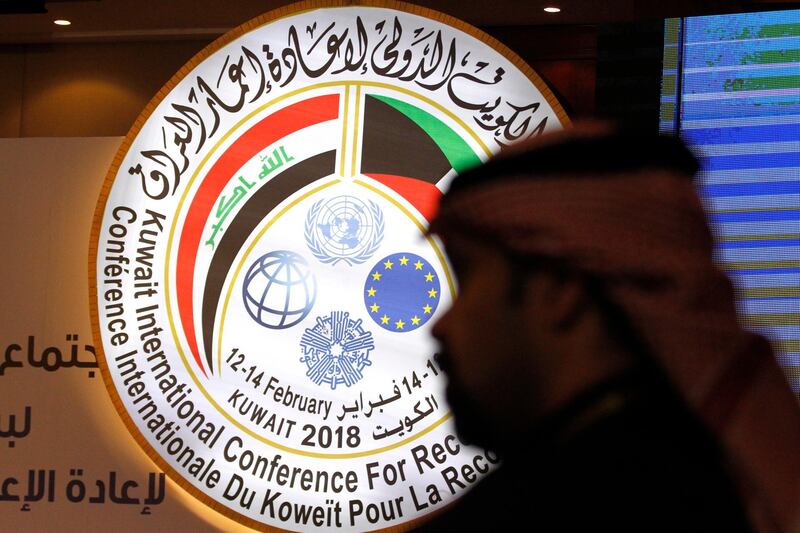Arab nations at the Kuwait international reconstruction conference are expected to step up their efforts to fund the reconstruction of areas destroyed during the war against ISIL in Iraq.
The conference brings together hundreds of representatives of countries, aid groups, UN agencies and corporations.
Iraqi government officials said on Monday at the opening of the three-day conference that the funds raised will be directed at a country that is now better placed to combat corruption and failures in investment accountability.
“The destruction is widespread, despite the resources Iraq has, we need the international community to help us rebuild and to reinvest,” said Mr Mehdi Al Alaq, the Secretary General of Iraq's Council of Ministers.
Iraq needs $88.2 billion (Dhs323.2 billion) to rebuild, Planning Minister Salman al-Jumaili said on Monday.
UN agencies UNICEF and UN-Habitat called for urgent investment to restore basic infrastructure and services for children and families. The World Health Organization called for investment in hospitals and other medical facilities, pointing to more than 14 hospitals and 170 health facilities destroyed.
Non-profit organisations have already pledged more than $330 million to reconstruction programmes aimed at providing humanitarian relief.
Kuwait non-profit organisations and government-supported charity institutions pledged more than $100 million of the figure. Meanwhile the World Bank pledged $400 million.
The US, which leads an international coalition that provided Iraq with key air support in the fight against ISIL, does not plan to pledge any money. US Secretary of State Rex Tillerson is due to attend the conference on Tuesday, following his visit to Cairo on Monday.
The US spent $60 billion on projects aimed at reconstructing Iraq after the ouster of President Saddam Hussein in 2003. Government auditors in 2013 found that at least 10 per cent of the money could not be accounted for, with billions of dollars wasted on dubious contracts.
_______________
Read more:
Time frame: Emirates Red Crescent has been helping the needy for 35 years
Iraq's oil industry is on the mend
Countries and companies converge on Kuwait City to meet Iraq's plea for funding
_______________
Iraq’s volatile security has driven foreign businesses from investing in a country that is only just starting to emerge from a three-year war and has yet to eradicate widespread corruption.
Over the following three days government ministers are set to outline their funding needs for two key areas, according to Lise Grande, the UNDP Resident Representative for Iraq.
"The government recognises that in order to build the confidence of the investors that they need to rebuild their country," Ms Grande told The National. "They'll need two sets of reforms, and those reforms can't wait."
One reform focuses on improving the business environment by allowing foreign companies to register rapidly and begin work on construction projects.
The rest are structural and infrastructure reforms which will serve to create a safe environment within which third party investors can be guaranteed safeguarding, including security from ISIL-related threats and business guarantees.
“The government came out and said: we are serious about reforms ... they know they need to give confidence to the international community that Iraq is a new country, a new place to invest and that will be protected and safe,” said Ms Grande.
Abdulwahab Al Bader, Director General of Kuwait Fund for Arab Economic Development (KFAED) reminded the attendees that Iraq was viciously attacked by terrorism, leading to the displacement of over five million civilians.
"Damage reached infrastructure, transport, power and water facilities, as well as crops, in addition to deterioration in educational and health services," he said.
"the Iraqi vision could be achieved through efforts exerted by the people in order to recover and bounce back economically, with the help of international development endeavors and the private sector," Mr Al Bader said.
Approximately 3.5 million Iraqis are still displaced from the three-year war against ISIL.
On Tuesday the conference will focus on private sector investment while on Wednesday national leaders are expected to announce governmental aid packages.
Meanwhile France's Foreign Minister Jean-Yves Le Drian visited Iraq on Monday to discuss the war-torn country's reconstruction.
"I have come to tell you of France's support and to accompany you. We will always be there. We were there to participate in the coalition. We will also be there in the reconstruction phase," Mr Le Drian said.
During his visit, he is expected to stress the importance of involving the Shiite-majority country's Sunni community in national reconciliation ahead of general elections in May, members of the minister's entourage said.
He is also set to express France's opposition to any death penalty for two French women awaiting trial in Iraq over accusations of joining ISIL.





